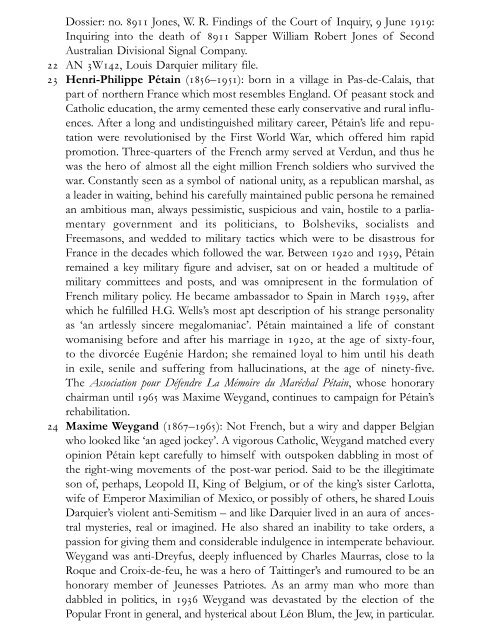The notes for each chapter are preceded by a list of ... - Vintage Books
The notes for each chapter are preceded by a list of ... - Vintage Books
The notes for each chapter are preceded by a list of ... - Vintage Books
You also want an ePaper? Increase the reach of your titles
YUMPU automatically turns print PDFs into web optimized ePapers that Google loves.
Dossier: no. 8911 Jones, W. R. Findings <strong>of</strong> the Court <strong>of</strong> Inquiry, 9 June 1919:<br />
Inquiring into the death <strong>of</strong> 8911 Sapper William Robert Jones <strong>of</strong> Second<br />
Australian Divisional Signal Company.<br />
22 AN 3W142, Louis Darquier military file.<br />
23 Henri-Philippe Pétain (1856–1951): born in a village in Pas-de-Calais, that<br />
part <strong>of</strong> northern France which most resembles England. Of peasant stock and<br />
Catholic education, the army cemented these early conservative and rural influences.<br />
After a long and undistinguished military c<strong>are</strong>er, Pétain’s life and reputation<br />
were revolutionised <strong>by</strong> the First World War, which <strong>of</strong>fered him rapid<br />
promotion. Three-quarters <strong>of</strong> the French army served at Verdun, and thus he<br />
was the hero <strong>of</strong> almost all the eight million French soldiers who survived the<br />
war. Constantly seen as a symbol <strong>of</strong> national unity, as a republican marshal, as<br />
a leader in waiting, behind his c<strong>are</strong>fully maintained public persona he remained<br />
an ambitious man, always pessimistic, suspicious and vain, hostile to a parliamentary<br />
government and its politicians, to Bolsheviks, socia<strong>list</strong>s and<br />
Freemasons, and wedded to military tactics which were to be disastrous <strong>for</strong><br />
France in the decades which followed the war. Between 1920 and 1939, Pétain<br />
remained a key military figure and adviser, sat on or headed a multitude <strong>of</strong><br />
military committees and posts, and was omnipresent in the <strong>for</strong>mulation <strong>of</strong><br />
French military policy. He became ambassador to Spain in March 1939, after<br />
which he fulfilled H.G. Wells’s most apt description <strong>of</strong> his strange personality<br />
as ‘an artlessly sincere megalomaniac’. Pétain maintained a life <strong>of</strong> constant<br />
womanising be<strong>for</strong>e and after his marriage in 1920, at the age <strong>of</strong> sixty-four,<br />
to the divorcée Eugénie Hardon; she remained loyal to him until his death<br />
in exile, senile and suffering from hallucinations, at the age <strong>of</strong> ninety-five.<br />
<strong>The</strong> Association pour Défendre La Mémoire du Maréchal Pétain, whose honorary<br />
chairman until 1965 was Maxime Weygand, continues to campaign <strong>for</strong> Pétain’s<br />
rehabilitation.<br />
24 Maxime Weygand (1867–1965): Not French, but a wiry and dapper Belgian<br />
who looked like ‘an aged jockey’. A vigorous Catholic, Weygand matched every<br />
opinion Pétain kept c<strong>are</strong>fully to himself with outspoken dabbling in most <strong>of</strong><br />
the right-wing movements <strong>of</strong> the post-war period. Said to be the illegitimate<br />
son <strong>of</strong>, perhaps, Leopold II, King <strong>of</strong> Belgium, or <strong>of</strong> the king’s sister Carlotta,<br />
wife <strong>of</strong> Emperor Maximilian <strong>of</strong> Mexico, or possibly <strong>of</strong> others, he sh<strong>are</strong>d Louis<br />
Darquier’s violent anti-Semitism – and like Darquier lived in an aura <strong>of</strong> ancestral<br />
mysteries, real or imagined. He also sh<strong>are</strong>d an inability to take orders, a<br />
passion <strong>for</strong> giving them and considerable indulgence in intemperate behaviour.<br />
Weygand was anti-Dreyfus, deeply influenced <strong>by</strong> Charles Maurras, close to la<br />
Roque and Croix-de-feu, he was a hero <strong>of</strong> Taittinger’s and rumoured to be an<br />
honorary member <strong>of</strong> Jeunesses Patriotes. As an army man who more than<br />
dabbled in politics, in 1936 Weygand was devastated <strong>by</strong> the election <strong>of</strong> the<br />
Popular Front in general, and hysterical about Léon Blum, the Jew, in particular.




